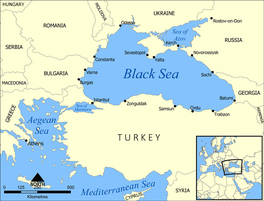Most Americans know the Mediterranean Sea is located between Europe and North Africa. In comparison, few know the location or importance of the nearby Black Sea, which sits between Asia and Europe and serves as a drainage basin for 24 countries across Europe. There are six nation-states along its coastline, including Ukraine, Russia, Georgia, Romania, Bulgaria, and Turkey. The Turkish Straits, consisting of the Bosporus and Dardanelles, serves as a gateway into the eastern Mediterranean. The Black Sea itself contains over 30 operating merchant seaports, including 12 in Ukraine, and forms a strategic corridor for trade, moving legal and illegal goods, alongside radioactive materials. Today oilfields and natural gas resources in the western portion under Ukraine’s exclusive economic zone are in danger due to Russia’s invasion of the country. According to John Daly of the Jamestown Foundation, Putin has turned the northern Black Sea into a de facto war zone, putting the entire region at risk.
The director of the Institute for Agricultural Market Studies, Dmitri Rylko, points out that the conflict has doubled the insurance premiums for merchant vessels entering the Black Sea and is likely to “result in massive unsold grain stocks.” Bulgaria and Romania, NATO Member states, normally receive Black Sea shipments of approximately 200,000 barrels of crude oil per day via their coastal terminals. Putin’s war, Daly says, has left Black Sea maritime trade in limbo. Although Russia has not formally declared a blockade of the Ukrainian coast along the Black Sea, insurance companies remain unsure whether to guarantee the safety of shipments, while foreign companies are uncertain about assuming the additional risk themselves. Since the end of February four cargo ships traveling in the Black Sea were either sunk or damaged by Russian missile attacks.
With grain shipments stopped and well over 90 foreign-flagged ships remaining in the line of fire, NATO’s Shipping Center is defining the Black Sea as “very high risk.” Tethered mines in the waters around Odessa, in particular, have broken free and are floating in the currents. As of last week, Turkish authorities, with assistance from Bulgaria and Romania, disarmed several of the naval mines drifting near the Bosporus. Daly points out that “foreign interest in utilizing Georgian seaports grew by 250 percent, mainly from European and Chinese shippers, since the start of the current Russo-Ukrainian war” as it is one of the safer areas located on the eastern side of the Black Sea. NATO announced recently, that “the threat of more drifting mines cannot be ruled out.”
The Financial Times is reporting that the conflict has severed Moldova’s normal import channels via maritime and Ukrainian overland corridors and ruptured exports to Russia, Belarus, and Ukraine. “This has forced the country to utilize more costly alternative routes and suppliers, aggravated by rising prices and energy deficits.” Naval mines, although outlawed in 1907 under the Hague Convention, have created an area of undeclared war in the Black Sea.
The Center for European Policy Analysis (CEPA) completed a 12-month study on security in the Black Sea region in which it concluded it is a critical but “largely overlooked component in Russia’s military strategy” in the context of Moscow’s revisionist geopolitical ambitions in the Central and Eastern European region. According to the CEPA report, Moscow’s increased militarization of the Black Sea has altered the balance of power in the region, restored Russia’s dominion in Eastern Europe and Eurasia, and enabled Putin to project power into the Mediterranean and Middle East.
In a CEPA document released this week, Lauren Speranza and Lt. General (Ret.) Ben Hodges argue that “Going forward, much more is needed to boost defense in the Black Sea region to support Ukraine, reassure vulnerable allies, and push back on Vladimir Putin’s unjustified aggression. Home to three NATO allies and two close partners, the Black Sea is a strategically important arena for the West to not only contain Russia, but counter China and defend against Iran.
The region also holds significant economic potential as the east-west corridor between Europe and Eurasia.” One solution, they suggest, is that NATO establish a “continuous blue water NATO naval presence in the Black Sea 365-days-a-year, with naval support infrastructure in Romania, Ukraine, Georgia, and Bulgaria that enables the maximum US naval presence within the parameters of the Montreux Convention.” The Black Sea was a critical frontier for a new European new security architecture before Putin invaded Ukraine. Today it is even more important if the West is to contain Russian imperialist ambitions.
Daria Novak served in the U.S. State Department.
Illustration: Wikipedia
